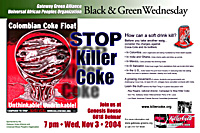VIEW
Flyer
8x11 PDF (272k) CLICK
HERE
8x11 144dpi JPG(311k) CLICK
HERE
PRINT
Flyer
8x11 PDF
(1.3gb) CLICK
HERE
PRINT FLYER 5x8" 2-up
PDF (762k) CLICK
HERE
COMPOST-DISPATCH
AD
5.5 x8.5"
PDF (762k) CLICK
HERE
PRINT
POSTER 24"x36"
PDF (903k) CLICK
HERE
Gateway Green Alliance
• Universal
African Peoples Organization
Black & Green Wednesday Forum
STOP Killer Coke in St. Louis
WHEN: 7 pm, Wednesday, November 3, 2004
WHERE: Genesis House, 6018 Delmar, just east of Skinker
A world boycott of Coca-Cola began July 22, 2003 to protest the killing of SINALTRAINAL union members in Coca-Cola bottling plants in Colombia. The forum will feature the following panel:
- Ray Rogers, national director, Campaign to Stop Killer Coke/Corporate Campaign, Inc.
- Don Fitz, Gateway Green Alliance/Green Party of St. Louis
- Lori Reed, American Friends Service Committee [moderator]
Coca-Cola presents numerous threats to the environment, human health, and social justice. Production of their syrupy poison consumes massive amounts of groundwater, depleting wells and aquifers. The Coke bottling plant in Mehdigani, India alone drains hundreds-of-thousands of liters every day and lowered the groundwater table by 40 feet. The plant also dumps industrial waste into the Ganges River in India which is both an important source of drinking water and a holy site in the Hindu religion.
Coca-Cola is liquefied sugar and caffeine. A 12 oz. can of Coke contains 39 grams (about nine teaspoons) of sugar and 34.5 mg. of caffeine (46.5 mg. for Diet Coke). Sugar is linked to numerous health problems, including diabetes, tooth decay, and the epidemic of obesity in American children. Coke buys much of its sugar from plantations that are known to exploit child labor. Now consider this in combination with the habit-forming caffeine and you get a lethal combination.
As if the consumption of Coca-Cola were not dangerous enough, the production itself can get you killed-if you work in a Coke factory in Latin America. Documentation is mounting about Coke's union-busting and collusion with death squads. The Colombian union SINALTRAINAL has sued Coca-Cola in the US, saying local bottlers have collaborated with death squads to kill union organizers. SINALTRINAL charges that in March 2004, administrators in Cucuta and Cartagena trapped workers in bottling plants to pressure them to renounce contracts.
These blood-trails often lead directly to American schools and universities where Coke has exclusive contracts to pander their product to the young consumers of our country. By offering under-funded schools desperately needed funds, Coke purchases a captive market of children who buy and consume massive quantities of their product without a clue as to its effects. Our schools try to improve children's minds while being complicit in the poisoning of their bodies.
This can be stopped. Coke is not a dietary necessity and has no nutritional value. If we can set aside our media-created wants, ridding ourselves of Coke's toxic brew should be easy. Ray Rogers with the Campaign to Stop Killer Coke (www.killercoke.org), says that a "corporate boycott" is a strategic and organized approach that confronts corporate power with power. A growing movement of unions, students and governments are challenging Coke. These include the International Longshore and Warehouse Union in the US, Dublin University College in Ireland, and the Muslim Consumers Association of Malaysia. Indian villagers have created slogans like "Save the village; chase away Coke." At least 20 US colleges have canceled contracts with Coke.
There are things we can do. Visit websites to learn more about the Coke Boycott such as the Green Party USA website: www.greenparty.org. Don't drink Coke and persuade friends, neighbors, and co-workers to boycott Coke as well. If you belong to a union, church or community group that has Coke vending machines, work with it to cancel the contract. Put up "Don't Bring Coke in Here" signs in your home and get groups you are involved with to put them up. Ask your school board to keep students off drugs and junk food by canceling contracts for Coke vending machines. Ask your college or university to cancel Coke vending machine contracts.
Call 314-727-8554 for more information and visit the Greens' web site: www.gateway-greens.org
Last updated 22 October 2004. Contact: contact@gateway-greens.org.

